- Home
- Paula Danziger
This Place Has No Atmosphere Page 4
This Place Has No Atmosphere Read online
Page 4
He stands up. “We understand how hard this is for you. Don’t think that we don’t. However, all things considered, we are going to the moon as a family—because we are a family. Your mother and I have agreed that if it’s absolutely unbearable for you after a year, then we’ll reconsider. And maybe let you return and stay with Grandma and Grandpa, even though we hate the idea of breaking up the family.”
Five years. Even a year seems like an eternity. And a year from my life is a higher percentage of time than a year out of my father’s life. Even I can figure that out.
“Daddy, please.”
He shakes his head sadly. “Honey, be reasonable. There’s company downstairs. Take ten minutes to pull yourself together and join us.”
After he leaves, I feel like throwing one of my squashed animals at the closed door, but decide not to take it out on them.
Instead I slam my hand into a pillow and for fifteen minutes think about possible disasters that could befall him that I couldn’t be blamed for.
Even though no life as we know it has been discovered in outer space, I hope that there is such a thing as a giant lunar lizard. And I hope that it eats my father—slowly, chomping on him with sharpened steel fangs, oozing lizard glob all over his body, breathing terrible slimy lizard breath on him during his last horrible moments.
After the monster’s done with my father, he can have my mother and sister for dessert.
There’s a knock on my door.
This time it’s my mother.
My parents like to alternate knocks on the door.
She comes in and stands there with her hands on her hips. “Everyone wants to see you. Come downstairs right now and act like a human being. You don’t want to spend the entire evening in this room and miss saying good-bye to everyone. Just think of how unhappy you’ll be if we leave for the training center and you haven’t said good-bye. Juna and Matthew and the rest of your friends are downstairs already.”
I stare at her.
She’s trying to sound calm, but I can tell that she’s not happy. “It’s up to you. It’s your choice. Come down now or stay up here.”
What a choice, I think. Giving in to them and joining the party as if everything’s okay or not having a chance to see my friends one last time.
I relent. “I’ll go downstairs.”
She smiles. “That’s my girl. And remember, no long face. You don’t want to turn this party into a disaster.”
When we get downstairs, my mother puts her arm around my shoulder.
I stand stiffly.
What I really want to do is yell and scream, but I can’t. Parents have a way of not letting you get away with stuff like that.
Since I want to be an actress someday, I’ll just pretend that this is all a play.
1.
ACT I. SCENE THE PARTY.
The heroine enters.
CHAPTER 9
CHARACTERS
Aurora, the heroine and wronged party
The parents, the villains
Starr, the sister and villainette
Juna, the best friend
Matthew, the boyfriend
Grandma Jennifer, a good person
Grandpa Josh, another good person
Assorted Turnips, relatives, and neighbors
The entire action takes place in the Williams’s house.
JUNA (clapping her hands). She’s here.
MATTHEW. I was afraid you’d never leave your room. (He puts his arm around Aurora, who puts her head on his shoulder.)
Olivia (who gives new meaning to the word heliumhead) heads toward the group. On the way over, she trips over Brandonetta Simmons, who is swaying to the beat of her own music.
OLIVIA. Aurora, I’m so sorry you’re leaving.
AURORA. Me too.
OLIVIA. Before you go, do you think you could teach me to do a triple cartwheel, ending in a headstand?
AURORA. We’re leaving tomorrow. I don’t think I’ll have a chance.
OLIVIA. I just know if I could do that I’d make the squad—now that you’re not going to be competing. (She rushes off to see Gary, whom she has a crush on. He rushes off to avoid her.)
JUNA. Well, that was disgusting. I don’t see how she could remind you that you won’t be able to be on the squad. Anyway, she doesn’t have a chance anyway.
AURORA. During junior high tryouts, she tripped on her shoelaces and her only split was the one on her lip from when she fell on her face.
A robot waiter stops in front of them, offering health food. Almost everyone waits for the robot who is carrying junk food.
The doorbell rings. Grandma Jennifer and Grandpa Josh arrive. They were born during the late 1980s and early ’90s and often talk about “the good old days.” They can even remember when computers couldn’t talk and when smoking cigarettes was still legal.
GRANDMA (comes over and pats Aurora on the head). Darling, it’s like cutting out my heart to have my family leave for the moon.
AURORA. My heart feels cut too.
FATHER (joining group). Jenny, don’t talk like that. You can get on the list and take the shuttle for a visit when there’s an opening.
GRANDMA. Don’t make it sound like it’s right in the neighborhood. You don’t just say “I think I’ll drop in on the moon today.”
FATHER (putting his arm around her). We’ll be back in five years. It’s not forever.
GRANDMA (clutching her heart). Only five years . . . . I could be dead by then.
AURORA. Grandma, don’t say that.
GRANDPA. She’s healthier than any of us. Don’t worry, honey. With all of the medical discoveries, we can expect to have a good chance to live to be a hundred. Anyway, you know that you’ve inherited your flair for dramatics from her.
GRANDMA. They can find a cure for cancer but they can’t find a way to keep your family from moving to the moon.
FATHER. Jenny.
GRANDMA. Don’t Jenny me. By the time you return, Aurora will be practically out of her teens. I’ll miss seeing her through some of the most important years of her life . . . and Starr too. I’ll miss seeing her go out on her first date.
AURORA (sarcastically). With the way Starr’s social life seems to be shaping up, she probably will never even have a date on the moon . . . so it won’t matter.
STARR. Ma, Aurora’s being mean to me again.
AURORA. Not mean . . . truthful. That’ll teach you to say that going to the moon is a great idea.
MOTHER. Girls! I don’t want to hear any fighting on our last night all together.
Ralph Norton approaches. Juna exits. He follows.
MATTHEW (noticing that tears are forming in Aurora’s eyes). Aurora, let’s go someplace where we can be alone together.
Matthew and Aurora walk into the backyard. They stand in the moonlight and kiss . . . and kiss . . .and kiss. There are sounds of the party in the background: people talking and laughing, Grandma Jenny crying, the robot waiters crashing into each other.
MATTHEW. I’m going to miss you a lot.
AURORA. I’ll miss you too.
MATTHEW (kissing her on the neck, knowing there will be a hickey there tomorrow to remember him by). I wish you didn’t have to go.
AURORA. I’ll be back in five years. We could wait for each other.
Damn, I think. This is not a play. This is real life.
He’s not going to wait five years. He already waited to get tall. He probably won’t even write after the first month or so.
It’s impossible. Here we are standing in the moonlight. By this time next month I’ll have moved to the place that’s shedding its moonlight on other couples . . . probably on Matthew and his new girl friend, whoever she’ll be.
By this time tomorrow, my family and I will be at the training camp . . . our house rented out . . . no Matthew, no Juna, no Turnips, no Grandma Jenny, no Grandpa Josh . . . none of the people and things I’ve known all my life . . . except my parents and sister—and we’re definitely not on each others’ favori
tes list this week.
No wonder I want to be an actress. Being anyone else is better than being me now.
If this were really a play, I feel like this should be
THE END.
CHAPTER 10
“Are we almost there yet?” Starr whines for the nine hundredth time.
“No, we’re not.” My mother turns around in the front seat of the car. “Look, can’t the two of you find something to occupy yourselves?”
“I’m not bothering anyone,” I remind her.
“Well, you’re the oldest,” my mother reminds me. “Keep your sister company. Do something with her.”
“What should I do with her?” I put my sunglasses on. “Teach her to dance? Pickle her?”
“Don’t be fresh to your mother,” my father orders. “Girls, look around on this trip. It’s going to be almost your last chance to see earth for the next five years. When we come back, everything will be different.”
Starr uses her sweet-child voice—“Okay, Daddy”—and looks out the window. In about three minutes, though, she flicks on her TV watch and checks out a favorite soap, As the Earth Spins.
I pretend to be asleep, but do look out the window. When you’re wearing sunglasses, it’s hard for parents to tell what you’re doing. No way will I let them think I’ll do any more than I have to do—not after what they’ve done to me.
The car passes lots of new construction. All over the country, single houses are being torn down and environmental hives are being built. That’s because there are many more people because of the last baby boom, which my father calls a “baby blast.” Anyway, there are so many blasters now, as a result of births, test tubes, and cloning, that there’s not a lot of room to live. (My father says that all that cloning around isn’t funny and he’s so upset by the situation that he won’t even let me play Rita Retrograde’s song “Send in the Clones.”)
One of the reasons my parents love the idea of going to the moon is that there’s not this kind of overcrowding.
Personally, I think that’s because not a lot of people want to live on the moon.
I’m sick of hearing how privileged we are to be chosen.
“Look!” My father points. “There’s the farm museum that we visited last year.”
“May we see it again?” Starr looks up from her wristwatch. “I’d love to.”
“Not enough time—as much as I’d love to stop.” My father shakes his head. “The first training-camp session takes place tonight. We have to be there.”
“What a shame.” Starr pretends to be soooo disappointed, but I notice that she goes right back to watching her soap opera.
What a fake she is! It’s my theory that in every family of two or more kids, there’s always the Goody Two-shoes and there’s always the bad one.
We have, I guess, decided which is which in the Williams household.
“Cows, horses, pigs,” my father says. “I remember when I was a kid there were still a lot of farms.”
“Ones that grew their own food,” my mother sighs.
I bet she’s remembering her own garden, which had to be given up when it became illegal to own more land than what your house stood on. Zero lot lines, it’s called.
Now there’s no need for old-time farms, either, because of the invention of Agri-Culture, by which food and animals are manufactured in artificial mediums.
My father pulls into a rest area. “Pit stop.”
We all get out of the car.
My parents hold hands for a minute and smile at each other.
Then Starr, Mom, and I go into the restaurant while my father stays outside to put a gas pellet into the compartment and to use the CAR-scan card computer.
I hope he enjoys using the car now while he can. There are no privately owned cars on the moon.
Starr, Mom, and I sit down at the table and punch our orders into the combination jukebox–food server. In a few seconds the music starts and our food arrives.
Mom starts another one of her heart-to-heart talks. She’s big on that . . . but not so big on heart-to-heart listening.
“I really want to thank you girls for cooperating and agreeing to come to the moon.”
We weren’t allowed the choice, I think.
She nods. “I know.”
It’s not great having a mother who is very talented in reading minds. All people take the courses that the parapsychologists have developed, but some are better than others. My mother is one of the best. In fact, she’s so good that she has had to learn to tune out a lot or she says that her brain would never rest or be focused. Maybe that’s why she’s so strong about what she says. Anyway, she doesn’t block out what I think. I’ve worked hard at trying to keep my thoughts from her, but it’s hard. She says she’ll never abuse her power and get too deeply into my thoughts, but sometimes I wonder.
It’s weird having a mother who doesn’t listen but can read your mind.
She takes my hand. “Aurora . . . trust me. We really do know what’s best for you and are sure that someday you will thank us for this experience.”
Someday, I think, and don’t care if she’s tuned in.
She takes Starr’s hand, too, and says, “By becoming settlers we will help all of humankind—not just because of your dad’s and my work but also because of both of you. We’re so proud that you’ve both agreed to be interviewed and tested. Just think how your input will help when Mars is settled.”
My input about going to the moon is making me very unsettled.
CHAPTER 11
Mr. “Call Me Buzz” Schwartz greets the group. “Welcome to CAMP, the training place for Coordinating American Moon Pioneers.”
Chumps Are Moon Pioneers would be more accurate, I think, sinking farther into the chair and looking around.
There are about a hundred people in the room . . . and not one of them is a cute boy my age.
In fact, there’s only one boy who seems to be about my age, and he is what the old gang would refer to as a barfburger.
“Call Me Buzz” is busy introducing himself. “Years ago, before space travel was common, I was called an astronaut, kind of like in the really old days when people who operated airplanes were called aviators and then when there was nothing special about plane travel, they were just pilot and crew. That’s the way it is now. I was an astronaut and now I’m a trainer at CAMP.”
I wonder whether he knows Juna’s parents. She once said that there’s an organization of astronauts who get together and talk about the old days when people used to get airsick and stuff like that.
This one girl is taking notes. I think she’s Barfburger’s sister. At least she looks like they’re related.
“Break up into groups of twenty-five,” Buzz tells us. “Then introduce yourselves to each other.”
I don’t move. It’s so scary to go into new groups.
My mother comes over and pinches me on the arm.
I move.
My parents and Starr go into three different groups.
I go to the group which does not have a member of my family in attendance.
Introductions begin.
The Mendez family, Mr. and Mrs. and their four-year-old quadruplets—Henny, Penny, Lenny, and Kenny—are first.
Mrs. Mendez says, “Little did I know that fertility drugs would turn into ‘fourtility.’ ”
“Some days it feels like futility,” Mr. Mendez says, as the quads do somersaults in the middle of the circle.
If there are not enough Mendez kids to start a sports team, at least they can be a cheerleading squad.
I wonder if the school on the moon has cheerleaders, or even a drama club.
Barfburger’s name is Vern Verne. It figures.
His sister is Julie Verne.
They both seem so yucky.
Vern has so many pimples that he could be a crater map of the moon. What makes it totally disgusting is that he’s always picking at them.
If that weren’t vomitous enough, Vern has this a
wful laugh that sounds like a seal after he’s caught a fish and is applauding himself—sort of a very deep voiced “Are. Are. Are.”
Julie looks like a nerf ball with mousy brown hair. Not only does her hair look like that but she’s always chewing on the end of it.
I wonder whether she ever coughs up hair balls.
Their parents are Agri-Culturists. It’s natural that the Verne kids are such plants.
Emily Doowinkle, in a mood-sequined mini, is a member of Writers in Residence and will be conducting poetry classes on the moon.
The person in the group who looks the most interesting to me introduces herself. “I’m April Brown, a junior at Antioch College. My work-study year will take place on the moon. I’m so pleased and excited to be chosen.”
She is dressed in a long lavender dress, with charm necklaces draped all the way to her waist. It’s impossible to tell what all the charms are, but somehow I know that each one was specially chosen and that there’s a great story about each of them. She also has different-color gemstones going up her multipierced earlobes.
She looks really terrific and different. It’s great to see someone so original.
Buzz joins our group and tells us that April has won a nationwide essay contest and is the only person who will be staying for just one year.
Maybe I’ll be able to go back the same time that she does. Then the trip back won’t be so all alone.
Salvador Arply speaks next. He’s this really weird-looking guy who has braided eyebrows and will be creating moon sculptures on a grant from the Universe Endowment of the Arts. “During the first years, most of the people sent to the moon were scientists, construction workers, miners, and manufacturers. Next came the support people—the families, the teachers. Now it’s time for the arts. So here I am—to create, to teach.”
I wonder whether actors will be sent to the moon.
Next, Buzz looks in my direction.
I look around.
It’s me.
I’m next.
People are looking at me. Unless I’m on stage, that makes me nervous.
“Aurora Williams. My father’s a dentist. My mother’s a doctor. I have a younger sister, Starr.”

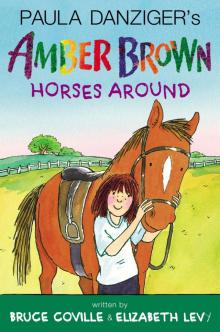 Amber Brown Horses Around
Amber Brown Horses Around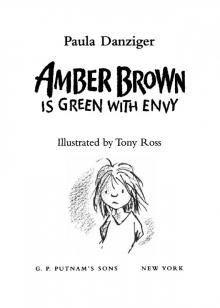 Amber Brown Is Green with Envy
Amber Brown Is Green with Envy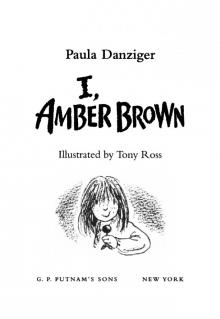 I, Amber Brown
I, Amber Brown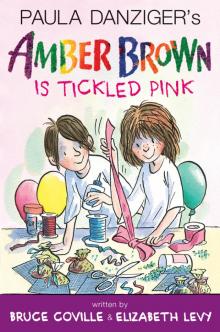 Amber Brown Is Tickled Pink
Amber Brown Is Tickled Pink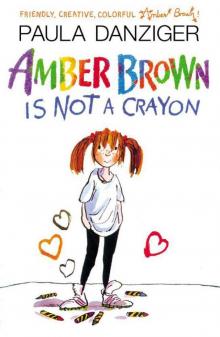 Amber Brown Is Not a Crayon
Amber Brown Is Not a Crayon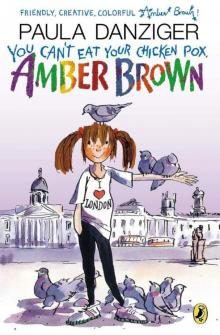 You Can't Eat Your Chicken Pox, Amber Brown
You Can't Eat Your Chicken Pox, Amber Brown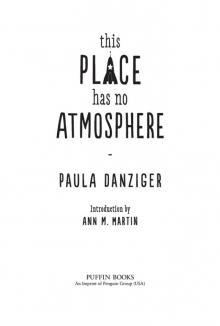 This Place Has No Atmosphere
This Place Has No Atmosphere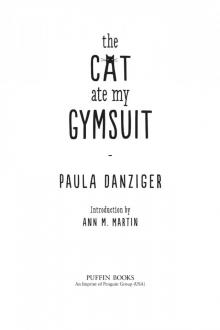 The Cat Ate My Gymsuit
The Cat Ate My Gymsuit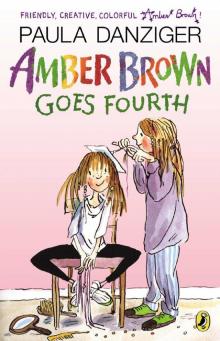 Amber Brown Goes Fourth
Amber Brown Goes Fourth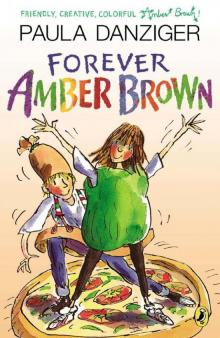 Forever Amber Brown
Forever Amber Brown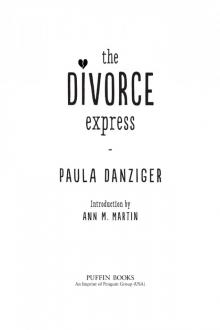 The Divorce Express
The Divorce Express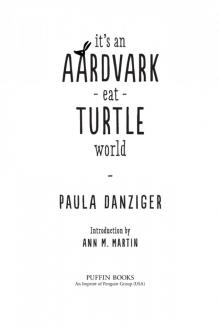 It's an Aardvark-Eat-Turtle World
It's an Aardvark-Eat-Turtle World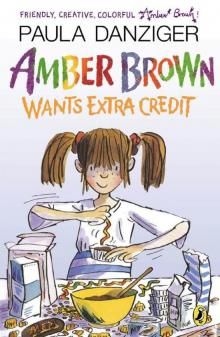 Amber Brown Wants Extra Credit
Amber Brown Wants Extra Credit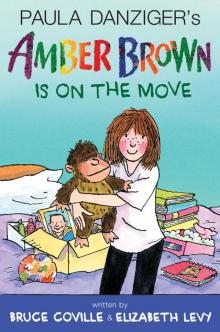 Amber Brown Is on the Move
Amber Brown Is on the Move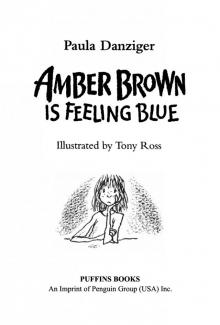 Amber Brown Is Feeling Blue
Amber Brown Is Feeling Blue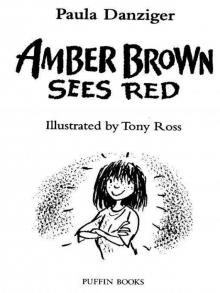 Amber Brown Sees Red
Amber Brown Sees Red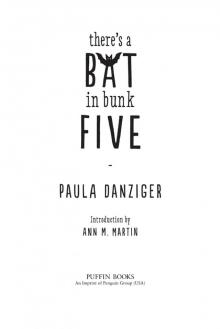 There's a Bat in Bunk Five
There's a Bat in Bunk Five